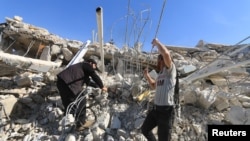More than 125 million people are living in crisis-affected countries, the World Health Organization reports, saying the three greatest emergencies are Syria, Yemen and Iraq.
The agency is appealing for $2.2 billion to come to terms with the escalating health crisis, in an effort to provide life-saving health care to 87 million people in more than 30 countries.
In Syria, the agency says 11.5 million people need essential medicines and primary health care, as well as trauma care and mental health care.
WHO says special care for mothers and children, as well as essential medicine and other health care, are needed by more than seven million people in Iraq and 10.6 million in Yemen.
In South Sudan, the focus of aid for 2.3 million people will be on combating child mortality by preventing and treating malaria, diarrhea and pneumonia, according to WHO.
Health care threatened
War and violence have wreaked havoc on these countries, says Rick Brennan, WHO's director of emergency risk management and humanitarian response. The destruction has been felt in the loss of health infrastructure, the loss of staff, and the disruption of health programs like vaccination programs, according to Brennan.
“I think the other issue is that none of these emergencies is going away any time soon,” he said. “So, we have to shift the way that we think about providing assistance there — not only to meeting acute needs, but working with partners on the ground to increase their resilience and their capacity to provide assistance."
Brennan says natural disasters also are of concern. He cites the health consequences of the El Nino weather phenomenon on countries such as Ethiopia, where some 400,000 children are suffering acute malnutrition.
In addition, the U.N. agency and its partners are responding to sudden onset emergencies such as Cyclone Winston that hit Fiji in February, epidemics such as the Zika virus in Brazil, a severe outbreak of yellow fever in Angola — the worst in 30 years — and the remaining risks of Ebola in West Africa.





